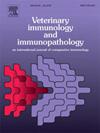BVDV non-structural protein 4B promoted autophagy by regulating p62/LC3-II molecule
IF 1.4
3区 农林科学
Q4 IMMUNOLOGY
引用次数: 0
Abstract
Bovine viral diarrhea virus (BVDV) causes bovine viral diarrhea-mucosal disease that is characterized by diarrhea, fever, leukopenia, and propagation disorders in host animals. Autophagy acts an important regulatory role during virial infection. However, the molecular mechanisms that BVDV induces autophagy remain poorly defined. Here, we report that BVDV non-structural protein 4B (NS4B) promotes autophagy in MDBK cells and HEK-293T cells by reducing the level of p62 protein and increasing the production of LC3-II protein, and NS4B proteins were able to improve autophagy in MDBK cells by inhibiting the phosphorylation of mTOR protein. In addition, NS4B (90–260aa) acts a main role in promoting autophagy. The results reveal a new mechanism of BVDV to induce autophagy in host cells and also provide a new theoretical basis for the interaction between BVDV and host cells, and an important target for the prevention and control of BVDV.
BVDV非结构蛋白4B通过调节p62/LC3-II分子促进自噬
牛病毒性腹泻病毒(BVDV)引起牛病毒性腹泻-粘膜病,在宿主动物中表现为腹泻、发烧、白细胞减少和繁殖障碍。自噬在病毒感染过程中起着重要的调节作用。然而,BVDV诱导自噬的分子机制仍不明确。本文报道BVDV非结构蛋白4B (NS4B)通过降低p62蛋白水平和增加LC3-II蛋白的产生,促进MDBK细胞和HEK-293T细胞的自噬,NS4B蛋白通过抑制mTOR蛋白的磷酸化来改善MDBK细胞的自噬。此外,NS4B (90-260aa)在促进自噬中起主要作用。研究结果揭示了BVDV诱导宿主细胞自噬的新机制,为BVDV与宿主细胞相互作用提供了新的理论依据,为BVDV的防治提供了重要靶点。
本文章由计算机程序翻译,如有差异,请以英文原文为准。
求助全文
约1分钟内获得全文
求助全文
来源期刊
CiteScore
3.40
自引率
5.60%
发文量
79
审稿时长
70 days
期刊介绍:
The journal reports basic, comparative and clinical immunology as they pertain to the animal species designated here: livestock, poultry, and fish species that are major food animals and companion animals such as cats, dogs, horses and camels, and wildlife species that act as reservoirs for food, companion or human infectious diseases, or as models for human disease.
Rodent models of infectious diseases that are of importance in the animal species indicated above,when the disease requires a level of containment that is not readily available for larger animal experimentation (ABSL3), will be considered. Papers on rabbits, lizards, guinea pigs, badgers, armadillos, elephants, antelope, and buffalo will be reviewed if the research advances our fundamental understanding of immunology, or if they act as a reservoir of infectious disease for the primary animal species designated above, or for humans. Manuscripts employing other species will be reviewed if justified as fitting into the categories above.
The following topics are appropriate: biology of cells and mechanisms of the immune system, immunochemistry, immunodeficiencies, immunodiagnosis, immunogenetics, immunopathology, immunology of infectious disease and tumors, immunoprophylaxis including vaccine development and delivery, immunological aspects of pregnancy including passive immunity, autoimmuity, neuroimmunology, and transplanatation immunology. Manuscripts that describe new genes and development of tools such as monoclonal antibodies are also of interest when part of a larger biological study. Studies employing extracts or constituents (plant extracts, feed additives or microbiome) must be sufficiently defined to be reproduced in other laboratories and also provide evidence for possible mechanisms and not simply show an effect on the immune system.

 求助内容:
求助内容: 应助结果提醒方式:
应助结果提醒方式:


